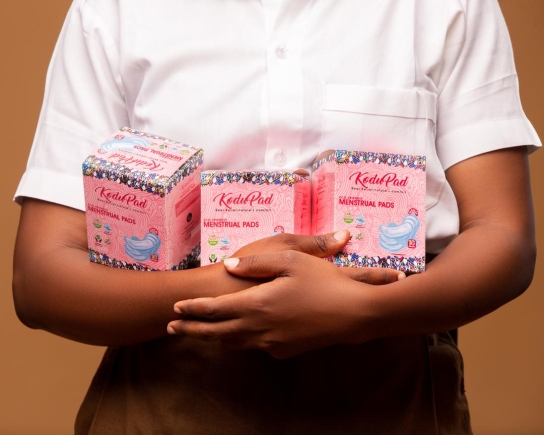
Ghanaian startup Kodu Technology tackles menstrual hygiene with agricultural innovation
A Ghanaian startup is winning international acclaim for a groundbreaking approach to menstrual hygiene that blends sustainability, innovation and social impact.
Kodu Technology, a social enterprise co-founded by Iddi Mohammed Faried, Mubaraka Umar Farouk and Longi Aadam Hayendimah, is transforming plantain and banana waste into eco-friendly sanitary pads, aiming to end period poverty while reducing agricultural waste.
“At Kodu Technology, we believe no girl should miss out on life because of her period, and no resource should go to waste. Turning plantain and banana waste into sanitary pads isn’t just innovation; it’s dignity, sustainability, and impact in action,” said Iddi Mohammed Faried.
The company’s biodegradable sanitary pads offer a lifeline to many girls across rural Africa who are often forced to miss school or withdraw from social activities due to the lack of access to hygienic and affordable menstrual products. At the same time, the use of fibrous residues from plantain and banana stems – materials that would otherwise rot or be burnt – contributes to environmental conservation efforts.
Supported by the Kosmos Innovation Center (KIC) and Mastercard Foundation through the KIC AgriTech Challenge and Incubation Programme, Kodu Technology has grown from a promising idea into a scalable business model. “At KIC, we support businesses that tackle real-world problems with innovative, locally driven solutions, and Kodu Technology exemplifies how agribusiness innovation can extend beyond food to address broader social challenges,” said Benjamin Gyan-Kesse, Executive Director of KIC.
Their progress has also attracted wider attention, with Kodu Technology winning the Circular Economy Competition in 2023 and the GoGettaz Agripreneur Prize in 2024, competing with other startups across the continent for funding to expand their reach.
Beyond product innovation, Kodu Technology is deeply embedded in the communities it serves. The company partners with women’s groups and smallholder farmers to source raw materials and distribute the sanitary products. This model not only creates jobs and stimulates local economies but also raises awareness about menstrual hygiene and tackles the cultural stigma surrounding menstruation.
Their outreach includes schools in underserved communities, where they lead menstrual health education sessions and distribute pads, giving hundreds of girls access to safe hygiene for the first time.
As the demand for sustainable, locally made menstrual products grows, Kodu Technology is positioning itself as a pan-African force for change. With strong backing from development partners and a bold vision for the future, the startup is proving that homegrown innovation can offer real solutions to some of the continent’s most pressing social and environmental challenges.
Through their efforts, Kodu Technology is not only giving girls dignity during their periods — they’re showing that African ingenuity can lead the way in global health innovation.